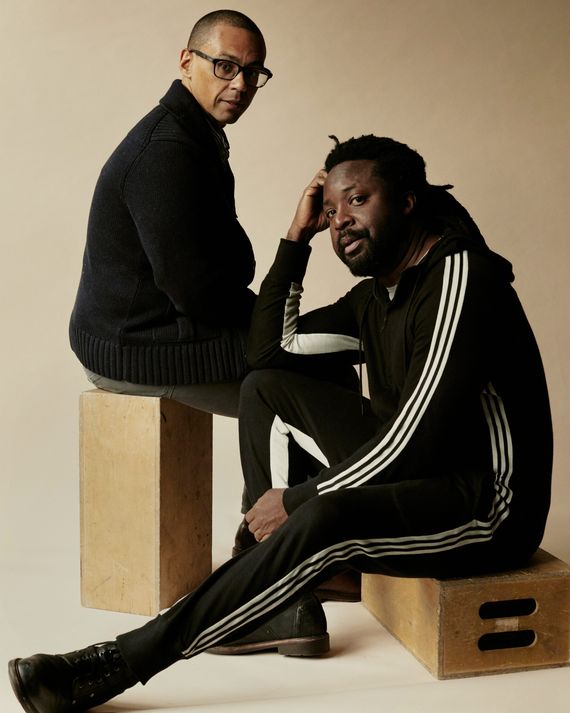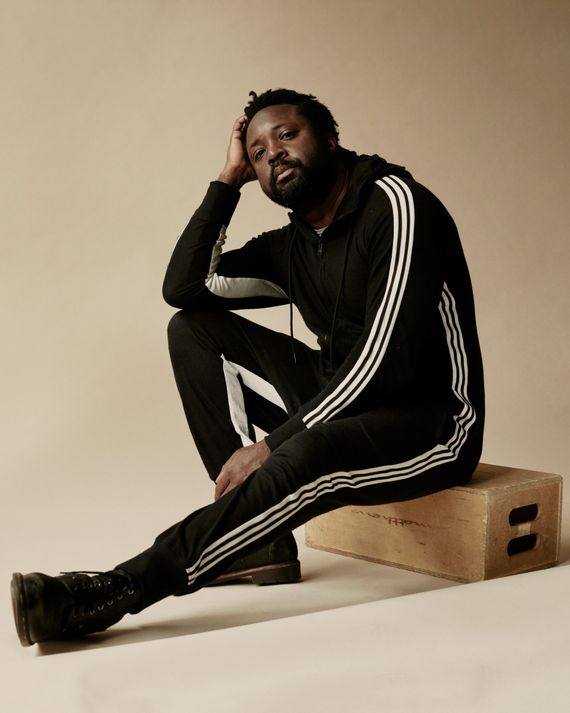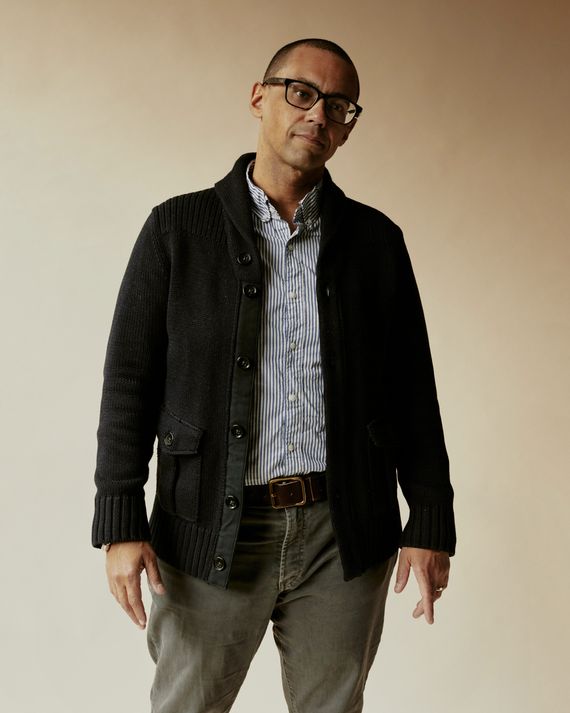
The other day, Victor LaValle, a Queens-born author who employs the form of the fairy tale as a barbed hook to lure readers into serious treatments of race, parenting, and the internet, ordered dim sum with Marlon James, a Jamaican author of sweeping social epics that delight in challenging all the conventions of narrative. Both have book projects out this week. Black Leopard, Red Wolf is James’s highly anticipated follow-up to the Man Booker Prize–winning A Brief History of Seven Killings. LaValle has co-edited a new speculative anthology, A People’s Future of the United States, prompting 25 of today’s biggest SFF writers to contemplate the future — and dark present — of the country.
The writers first met a decade ago, at a reading in Harlem for James’s second book at the Hue-Man Bookstore (since closed). “That was a great night,” LaValle said. James nodded and added darkly, “Mismanagement killed that store.” They were coming together again just after LaValle had written a Bookforum cover review of Black Leopard. His own speculative-fiction background made him a good match for what James has described as his “African Game of Thrones” — his first foray into high fantasy, an epic quest about a search for a missing boy through a mythical Africa populated by vampires and witches and unreliable narrators. LaValle loved it. “This book might do his finest job yet of blending the horrific and the exquisite,” he wrote. He also felt the book serves a higher purpose: “Every page reads like a corrective to what’s still too often left unstated about the fantasy genre: If literary fiction is quite white, fantasy is even whiter still.” (James, for his part, blurbed LaValle’s last book, The Changeling, calling it “a mesmerizing, monumental work.”)
LaValle looked crisp and professorial in a button-down shirt and cardigan, James languid and hip in a super-heroic one-piece, a black-and-white Y3 jumpsuit. Over a lunch of crab soup dumplings and scallion pancakes with Vulture, they talked about the changing state of speculative literature, the books that shaped them as kids, why they each left literary realism behind, and what they envy about each other’s work.
You guys wanna get a drink?
VL: I’ll always say yes to a drink.
MJ: You know, there’s the British colonial in me that’s going, Alcohol? Before evening? And then I’m like, Yeah, but it’s called Lucky Lychee. I might have to get that.
VL: I’ll get the Fallen Angels.
MJ: So I read your review.
VL: What’d you think?
MJ: I gotta say, that’s maybe the first time anybody’s ever mentioned that I write about sex. I actually kinda screamed.
VL: Did you feel all right with me talking about that aspect of it?
MJ: Absolutely! I don’t mind people writing about the violence, but it tends to be all they write about.
VL: For a black writer writing about gangsters, violence is almost the go-to. But sex is absolutely a part of your work in such a big and vital way, as another form of — not just violence but as communion, communication. I was talking about this with my wife [the writer Emily Raboteau], and she pointed out that none of the reviews of your last book mentioned sex at all. So as I was reading this one, I was like, It’s here, too. I just need to say, people should talk about sex.
MJ: Literary realism has this sort of indie-film attitude toward sex. Violence is violent, but sex isn’t sexy. It’s compulsive; nobody’s happy; they enjoy the cigarette way more than the sex. Sometimes I read these novels, none of which I’ll name, and I go, It’s not that hard to enjoy sex, people.
VL: I wonder sometimes if it betrays a fear, because to talk about how any person enjoys sex, you have to risk admitting to a thing that you think is supposed to be sensual and somebody else is maybe gonna laugh or say, “How dare you find that pleasurable?”
MJ: Right, they’re scared of love, too. I know, because I was. And anything that demands an extreme intimacy.
VL: Except violence. That’s an intimacy that is tolerable.
MJ: I always give this out-there comparison to Led Zeppelin IV. Led Zeppelin are known as the masters of heavy metal, the reason why we put the volume to 10 or 11. Yet almost every Led Zeppelin record is 50 to 60 percent acoustic. Anybody else, that’s like a really folky Jeff Buckley record with some loud noise. It’s because the loud tracks resonated. I think people don’t know the difference between resonance and preponderance. Violence is supposed to resonate. When violence happens in your family, that lives for generations. You’re supposed to still be reeling from it ten pages later. Violence should resonate and sex should resonate and romance should resonate.
Let’s talk about what’s going on in speculative fiction today. How is it changing?
MJ: There are so many writers now who’ve been blurring the line between so-called literary and so-called genre that they become almost meaningless. It used to be people thought you were slumming if you wrote genre.
VL: Genre work can still face that problem of people saying, “But what’s it really about?” That can still be the sticking point for this stuff being “taken seriously” or not.
MJ: There’s this rush to think that the only way readers can take it seriously is if it’s an extended metaphor for something. But when I was writing this novel, I don’t think I was messing with reality — I was writing reality.
VL: Literary realism demands that everybody agree on what real life is — and it is really a very specific subset of American or European life — but if all the writers and the critics and the jurors for the prizes agree that this is our life, it becomes realism. I love reading the fantasy of middle-class life in Connecticut, because I’ve never lived that before. Do you all really cheat this much? That to me is like, Wow!
MJ: I grew up in an independent Jamaica, but my classes were still very British colonial. I was taking British exams because it was all that was available. But, the difference between me and my parents was that they couldn’t stop pop culture. Despite it being impressed on me that this, over here, is literature, and comics are something different, I grew up refusing to distinguish between them. I am getting the same feeling from Love and Rockets that I’m getting from One Hundred Years of Solitude, but I’m supposed to look at one as, that’s comics and that’s a serious novel? From a very early age, I thought, That’s bullshit. The whole idea of a great American novel is bullshit. But if you twist my arm, I’m probably gonna say American Tabloid and Love and Rockets.
What was the first fantastical book that you loved?
MJ: Robin Hood, even though it’s more of a myth. Maybe it’s history; maybe it’s not. Certainly men running around in green tights makes no fucking sense. But to me, fantasy has to include comics, so I’d also have to say Justice League, Superman. They used to have these things called Superman Family, Batman Family. So they’d have Batman, Batgirl, Batdog. [Laughs.]
VL: Bat-Mite! The little elf creature who also came from another dimension. One of the great parts of growing up with comics is that things aren’t precious. A new writer throws something against the wall and some things just last. Like Krypto the Superdog, for no reason at all, lasts, and then there’s Superman’s superpowered chimp who just didn’t make it.
MJ: It’s because that superdog was cooler.
VL: He was amazing! The first book I loved might’ve been Journey to the Center of the Earth.
MJ: I forgot Jules Verne! Twenty Thousand Leagues Under the Sea.
VL: There’s this great adventure, and it’s always treated like it’s almost plausible. This could happen, you could go to the center of the earth and find a prehistoric world. In theory that was speculative realism up until you proved it wasn’t. And Twenty Thousand Leagues Under the Sea is still realism.
Each of you started out writing more realistic work, and each has now fully transitioned into genre. How did that feel?
VL: The first book I did it with was Big Machine, my third, and I did it because literary realism was not making me happy at all. I was mining personal details to the end of what that was worth. The switch was to say, Let me at least return to joy. It seems cheesy, but I really do feel like that sense of joy became imbued in the text. People were touched by those first two books, but nobody ever said they enjoyed them. Then once I made the transition, even as characters were killed, people would say, “I really enjoyed that.” I think it’s because I was enjoying myself.
MJ: I don’t want you to think I’m attacking realism, I’m still a big devotee, but I wrote like that ultimately out of a sense of duty, meaning I had a very clear idea of what books were supposed to be, what they were supposed to read like. I was reading Zola, lots of Henry James, people I still love, but when I started to write like that, it felt a bit pedantic to me. Like I was trying to assume the form of a writer. This is what a writer should be. It was in reading Salman Rushdie’s Shame that I had my breakthrough. I didn’t know you could just throw phantasmagorical stuff into a book like that. I didn’t know you could write a book as if there were no rules.
So even my first novel had things like women drinking scalding water and spitting it in the fire so they could fly. I’ve always had that in the stuff I write, which is why it never felt like a big jump to me to write fantasy. But it was the same thing: At some point I divorced not from realism, but from the idea of what a novel should be. Then I wasn’t afraid to put the story in my head down on paper.
What does each of you like most about what the other writer does?
VL: It’s the confidence with which James jumps through the history of a place, or a time, or a group of folks on a plantation, or a village. I’m always amazed by the way you jump and jump and jump, and it never feels like there’s a stumble — by the fleet-footed nature of the voice.
MJ: You know what I envy about you, Vic? You always get there first. You’re playing with genre, you’re sliding into the fantastical, you’re writing these really big universes, but you’re still capturing things like loneliness. Your last book, The Changeling, plays on so many fantastical things. Even the title implies something that’s almost African — the shapeshifter and the shift in storytelling, and how do you trust this, how do you believe that? I’ll often think of something, and then I’ll go, “Oh shit — Vic got there already.”
I’m curious to hear you guys talk about this idea that Black Leopard, Red Wolf is the African Game of Thrones — and the genre expectations that carries with it. You could say a lot of things about Game of Thrones but one of its defining characteristics is that it’s driven by plot more than anything else.
MJ: It’s also a grown-ass book. One of the central achievements Martin did was to take very fantastical elements and put it into very adult story. I love how he kills off characters. I love that there are adult consequences. There’s certainly a very adult attitude toward sex and sexuality, which is very unlike most other genre books. That’s one of the thrills of it. But what was the question again?
Just the genre expectation it sets up, to call this the “African Game of Thrones.”
MJ: Oh god. [Sighs.] Because I said that as a joke.
VL: But it was too good. It was a great line.
MJ: I said that as a joke in a magazine and it took off so much that even Martin emailed me saying he was so excited.
VL: You know, the danger of the African Game of Thrones line would be to say, “You think Europe was great, Africa was even better.” And it doesn’t do that. It takes it for granted that these were great empires, that these were places of great myth and magic, in a way that I loved. It doesn’t do any special pleading. These empires were powerful, great, interesting, small, petty, all that. As a reader, it was such a relief.
MJ: I certainly enjoyed writing a lot of the tropes of medieval fantasy, but I also enjoyed upending them. So yeah, there’s fairies, there’s witches, there’s immense evil, there’s heroes, there’s shape-shifters. But a lot of the African mythologies deliberately upend those tropes, because they’re not European stories. They’re not secretly Christian allegories. Take this one central African myth about a cannibal witch — it follows none of the conventional narratives. The witch doesn’t get her comeuppance. The only person who outsmarts her is her own daughter and her daughter’s best friend. When she realizes she’s outsmarted, she goes, “Alright, I’ll go die now.” And that’s what’s so great about it.
One of the things we take for granted in a fantasy quest is that everybody’s faithful to the quest because when the person betrays the quest, it’s a big thing. But my novel is teeming with betrayal. In African storytelling the trickster tells the story, so you’re already dealing with an unreliable narrator.
VL: One of the things I was so happy to see missing in your book was that feeling of nostalgia that’s built into so much fantasy. Martin’s books are missing that too. Every time I read fantasy books that have that nostalgia, I remember this thing that happened to me in the first semester of my MFA program. Somebody had written a piece that took place in the middle ages and we’re sitting in the classroom, and I’m the only nonwhite person, and the instructor says, “I mean, honestly, who wouldn’t want to live in the Middle Ages?” I just raised my hand and was like, at least one person here, probably not.
MJ: That’s like me the last time I crashed a Mad Men party. [VL laughs.]
But genre can also be something that helps readers engage with a work. You go in with an idea of what you might get.
MJ: I want to know if sometimes it causes problems. I actually had some trouble trying to find a British publisher for this book. A lot of publishers, who shall remain nameless, all said the same thing: “It’s too literary for sci-fi and too sci-fi for literary. And neither audience will read it.” Which I thought was pretty ridiculous, because that’s exactly the reason the American publisher said everybody’s gonna read it. I wonder sometimes if the problem is that publishers and critics end up limiting the audience. There’s no reason why a Toni Morrison reader shouldn’t read Octavia Butler.
VL: One of the things that’s been a revelation for me is the the welcoming nature of those genre communities — horror, sci-fi, spec fiction. It’s been overwhelming to me to realize there are people who just want books to be good and who aren’t coming in with their arms crossed, like, “You better wow me.” They’re just like: “I want to be wowed.” It’s so huge, that tiny difference.
When did each of you first realize you wanted to be a writer, and what kind of writer did you imagine you would be, back then?
MJ: I know when I first wanted to be a writer, I thought I’d be writing X-Men by now. That was my big dream, to take over from Chris Claremont.
VL: That’s a pretty great dream!
MJ: But really, growing up in Jamaica, I don’t believe that being a writer was one of the fantasies I got to have. Because almost everyone I knew who was in the creative field was something else. They did it on their spare time, like the lawyer who sings. I didn’t know any writers. I didn’t realize I was a writer until somewhere after I published my second book, and somebody asked me what would I be doing if I wasn’t writing. I couldn’t answer the question. I don’t know! I think this is it! I don’t have anything else.
VL: For me, I think it was reading Stephen King’s Night Shift. It was the first time I started trying to write, and felt totally like, I want to do this. I wasn’t thinking about it as a career, like I’m going to make a living blah blah blah. But it was like, what he’s doing here with these stories, that’s what I want to do. I started writing essentially pastiches, or rip-offs, of a couple of those stories in particular.
Do you feel like there’s something about writing in genre that feels more subversive or politically significant because the genres have been, historically, so predominantly white?
VL: I feel like writing in any genre, literary or fantastical, is potentially pretty revolutionary. The genres maybe haven’t caught up to the writers or the readers even quite yet. But, at least to my mind, to my Twitter feed, there’s so many people doing it that it almost feels like the genre doesn’t know it has changed yet, and you have some people still trying to shift it back toward the old way, and they don’t realize that they’re already ghosts. They’ve already died. It feels good imagining them having to wake up.
MJ: I didn’t feel subversive. I felt like I was joining a conversation that was already going on, and I thought I could contribute to it. Ultimately, it wasn’t so much that I was trying to do this sort of capital-M move into genre, so much as it is I always wanted to tell these kinds of stories. I knew I would eventually. It feels inevitable. I just knew I would end up here.
*A version of this article appears in the February 18, 2019, issue of New York Magazine. Subscribe Now!




